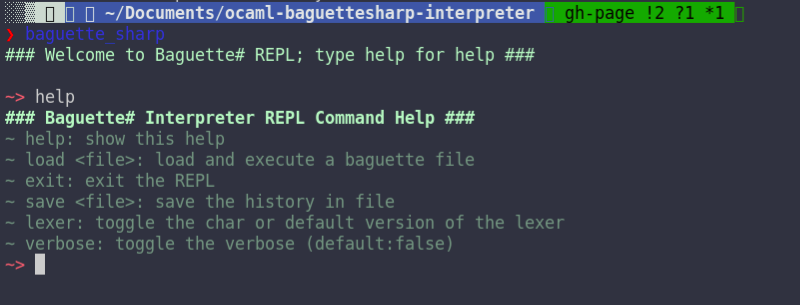REPL
Table of Contents
- OCaml Baguette# Interpreter
- REPL
- Basic Usage
- Advanced Usage
- Random Guessing Game
- Binary Turing Machine
- Binary Turing Machine Examples
Links
Prerequisite
The executable of baguette-sharp, either from the precompiled binaries downloadable in the header or from compiling/installing the project with
dune build/install
here the executable is assumed to be baguette_sharp and in the $PATH
General command line
typing in a terminal
baguette_sharp --help
gives you the help of the command which is

--inputis the location of the input file to interpret--outputis not implemented yet--verbosetoggle the verbose on (default is false) which shows the lexed code and prints the AST before interpreting it--versionprints a nice little ‘about me’ line--lexertoggle the char version of the lexer on (default is off)
REPL Commands
Not specifying an input file launch the REPL for example baguette_sharp alone launch the REPL

The REPL top commands are the following
helpshows the displayed helpload <file>loads an external baguette file (note this supports auto-completion)save <file>saves the history ofBaguette#commands in the specified fileverbosetoggle the verbose on/off (default is off)lexertoggle the new lexer on/off (default is off)exitexit the REPL
N.B the following command are equivalent:
baguette_sharp --verbose
and
baguette_sharp
then toggling verbose on. Same with the lexer
REPL
Variable
By default the REPL shows the information about an incoming variable.
The example bellow shows what happens when typing only Hello in the prompt

And the difference between adding and printing the addition:

The same code interpreted through a file only shows the latter

Hinting
The REPL shows hint when a function / keyword is typed
Function

Keyword

Auto-completion
Lastly the REPL editor uses Linenoise to provide auto-completion when using baguette commands

Command Line
The Command Line Version of Baguette# just execute the file for example
baguette_sharp --input examples/math.baguette
Shows

Errors
In the last version (2.0) of Baguette# a real system of errors (without the way of handling them just yet though) has been implemented. Here is some example
Wrong Type
 The error was raised because
The error was raised because MADELEINE take a string as parameter and 0 is an integer
Syntax
 The error was raised because the variable
The error was raised because the variable test we were trying to access do not exist
List of errors
there is _ types of error
Wrong Type Errorraised when you supply a parameter of a wrong typeSyntax Errorfor errors relating to runtime and/or syntaxOut Of Bound Errorraised when you try to access an element of an array which do not exist (ex element 5 of an array of size 3)Argument Errorwhen you supply not enough arguments for an instructionErrorfor the other types of errors.